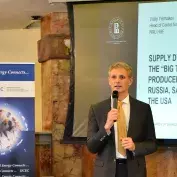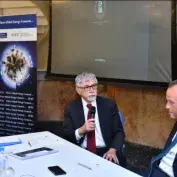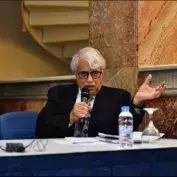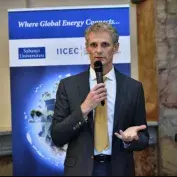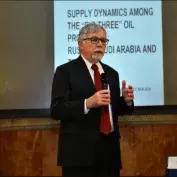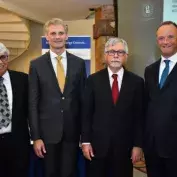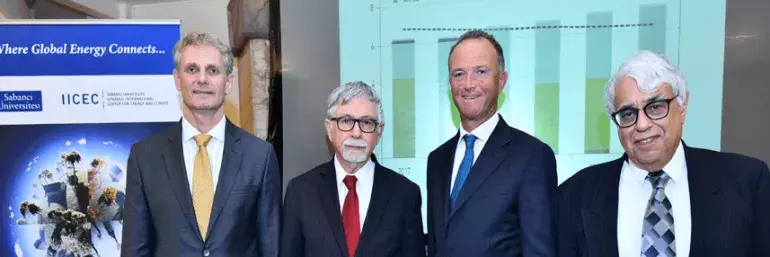
Seminar by Vitaliy Yermakov "Supply Dynamics among the ‘Big Three’ Oil Producers: Russia, Saudi Arabia and the USA”
Sabancı University Istanbul International Center for Energy and Climate (IICEC) revealed a new report by Head of Center for Energy Policy Research at Higher School of Economics, Dr. Vitaliy Yermakov on “Supply Dynamics among the "Big Three" Oil Producers: Russia, Saudi Arabia, and the USA”. According to the report presented by Dr. Yermakov, the world is transitioning to a low-carbon future, and the strategic conflicts of interest among Russia, Saudi Arabia and the USA in the global oil market can lead to dramatic and destructive price fluctuations.
Bringing together key stakeholders in energy and climate issues, Sabancı University Istanbul International Center for Energy and Climate (IICEC) continues to publish breakthrough reports. The report “Supply Dynamics among the "Big Three" Oil Producers: Russia, Saudi Arabia and the USA” written by Head of Center for Energy Policy Research at Higher School of Economics, Dr. Vitaliy Yermakov for the IICEC Energy and Climate Research Series was revealed at an event held in Istanbul.
Hosting the event, Sabancı University IICEC Director Prof. Difiglio delivered introductory remarks, saying “IICEC will continue to invite the most prominent names in the sector towards its mission of being a respected platform that brings together key stakeholders in energy and climate issues.”
Dr. Vitaliy Yermakov presented the report, discussing how the developments in the Russian, Saudi and US oil markets over the last decade shaped the petroleum industry, why and how their strategies changed over this time, and the implications of these changes on the present of the industry. The report presentation was followed by a panel discussion with Abdullah Bin Hamad Al-Attiyah Energy and Sustainable Development Foundation Energy Advisor Howard Bevan and Engie Turkey CEO Denis Lohest on the report and the industry in general.
Dr. Yermakov: “Russia may never be as strong as it looks, but it will never be as weak as it seems."
Dr. Yermakov began by underlining the rate of variability in petroleum prices. Discussing the impact of actual supply-demand balance and national strategies on the petroleum market, Dr. Vitaliy Yermakov said, "America, Russia and Saudi Arabia account for nearly one-third of all petroleum production in the world." Dr. Yermakov continued: “The boost in production reduced oil prices. The increase in American production was a surprise to everyone. Oil trade moved to new markets; in particular, the US began to aim for the European and Asian markets. Meanwhile, Saudi Arabia started to play a more active role in OPEC.” Commenting on the agreement between Russia and OPEC being longer-term than expected, Dr. Yermakov said, “The agreement withdrew the excess oil from the market and brought some stability. Russia's tactical reduction of the Rouble's value in the last few years translated to stability in oil production over a longer term."
Speaking in the panel discussion, Abdullah Bin Hamad Al-Attiyah Energy and Sustainable Development Foundation Energy Advisor Howard Bevan said: “The term of the agreement between OPEC and Russia does not solely depend on the success of the parties. It is an opportunity yielded by the negativity of the situation and ongoing issues in other countries.”
Engie Turkey CEO Denis Lohest said:
“We should focus on whether there is a possibility for the petroleum market to be split; it is important to note what factors will affect this market, and to what extent. Oil production has become a major influence on the petroleum market.”
How did the "Big Three" shape the market?
The IICEC Energy and Climate Research Series report “Supply Dynamics among the "Big Three" Oil Producers: Russia, Saudi Arabia and the USA” study the dynamics that the three largest oil producers of the world created when they built the oil market, how they shaped the marketplace, and the current situation.
According to the report, the world is transitioning to a low-carbon future, and strategic conflicts of interest in the global oil market can lead to dramatic and destructive price fluctuations. Under these circumstances, it becomes important to think of the whole timeline from the past to the present and the future, understand how the developments in the Big Three changed the oil industry, why and how strategies have changed, and what these changes mean. The report outlines the challenges faced by the Big Three, and takes a comprehensive look into the developments in the global oil market. The main issue observed by Dr. Yermakov in the report is how producer and exporter companies with different revenue needs and levels of financial resilience will reach an agreement.


